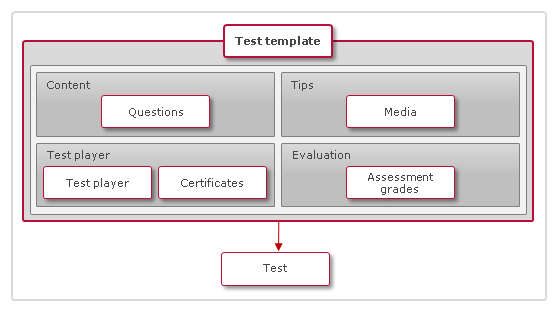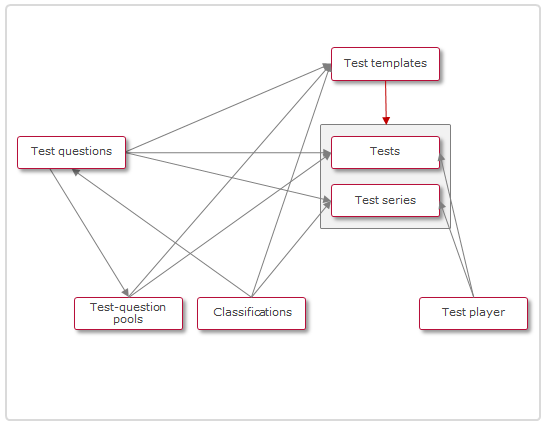Test templates are available for tests and test series and are useful when the same or similar elements are used across multiple tests or test series. These elements include welcome messages, specific questions, evaluation levels, or progress settings.
Tests can be created manually or on the basis of a test template.
The creation of a test template is the same as the creation of a test, in principle. The same tabs are available, Some settings can only be booked and specified however at the test level.


Functions of the Test Template Manager
New
The same setting options as for tests are available. There are some differences between test templates and tests, which are described as follows.
Description and Displayed Texts
The description tab serves to collect information on the test template itself and determines the basic settings of the test (e.g. languages in which the test can be conducted). The texts that are to be displayed in tests can be entered in the appropriate tab (e.g. welcome messages, learning objectives, etc.).
It is possible to select a proctoring service in the test template. This service can be configured in the external service provider manager. The proctoring integration requires the proctoring license and an agreement with the respective proctor service provider.
If the export of the test template is desired, it is important to ensure that in the HTML editor fields, only the editing options provided are used, otherwise, the desired representation into the exported PDF file cannot technically be guaranteed.
Contents
Whereas editing the content tab of a test template works exactly like editing a test, a difference applies to test series templates:
If the questions of a classification or a test-question pool are selected upon adding questions, not the questions will be displayed in the list of added elements, but only the classification or test-question pool. Only upon creating a test series from a test-series template, all questions assigned to the classification will be added in their current versions. For test-question pools, the version that is currently deposited in the pool will be added.
As a result, standard and mandatory questions and the number of questions to be shown per folder at the test-series-template level can only be determined at the test-series level.
In order to guarantee that a standardised evaluation can be carried out, the direct addition of free text questions to test series templates is not permitted.
Proctoring
Tests can be preset for proctoring in the test template by choosing the procotoring service in the description tab. The procotoring service needs to be added in the external service provider manager beforehand. When starting a test by clicking the course component, the test/exam prechecks are started on the proctoring platform that was selected.
Test Player
The test-player setting determines the testing process for learners and enables or disables various additional information for a test:
-
Viewing options
-
Navigation
-
Options on feedback per question
-
Options on the display of results
-
Restriction of processing time
Test players are managed as objects themselves and can be selected upon creation or editing of a test. Manual, user-defined settings can also be adapted for each test, or existing test players can be selected and modified for the test. The resulting settings are also considered user-defined.
If a test player is selected in the test but not modified with user-defined settings, its settings will not be changed when there are changes to the selected test-player object itself. The changes made to the test-player object can be made manually for the test. Default settings can be restored.
The "Lock with personal access code" option allows the possibility to define that the test will only be available to the learner when the correct personal access code is provided. The personal access code will be automatically generated per course per test per participant. It can be accessed via the course instruction syllabus tab, where a test can be selected and the overview accessed via progress per user. The personal access codes can also be sent via e-mail to the corresponding roles via the course component section.
NewUpon entering the create page, an indication as to whether a test or a test series is to be created is required.
Edit
Edit
Delete
Delete
Clearances
Clearance
Versioning
Versioning
Global Functions and Related Topics
Search in ManagersLanguagesTest ManagerTest QuestionsTest Question PoolsTest Player
